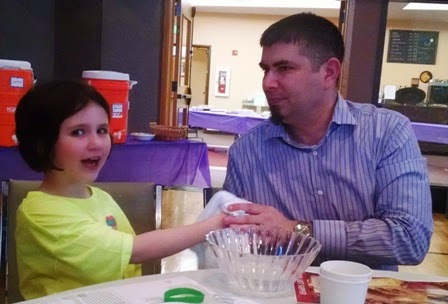Holy Week is an essential time in the life of a church. Each
year, the same question comes up: how should we best present the last hours of
the life of Christ, so that we remain faithful to the biblical message without
repeating a routine, year after year? How do we celebrate those ancient events
while making them current and relevant to the 21st century
parishioners?
Thursday – Last
Supper and Clean Hands
Thursday is Maundy Thursday – from latin “Mandatun” which
means “commandment”, referring to the “new commandment” given by Christ during
the last supper.
In the Gospel of John, in lieu of the command to eat the
bread and drink the wine – representing the body and blood of Christ – we find
Jesus insisting on washing the feet of his disciples. They are embarrassed.
This task belonged to the least of the servants in a traditional household.
Jesus was teaching them an attitude of
service toward each other that would be instrumental in bringing the Kingdom of
God closer.
Irvin and I did not spend this evening together since CIF
and UPPC both had planned a potluck dinner that night. There would also be a
time of worship and communion. At UPPC, we also would wash each other – not feet,
but hands. This was a suggestion that came from my experience at CIF. We did so
a few years ago.
Washing feet was a tradition at the time of Jesus, where
everyone had to walk their way to their destination on the dry and dusty paths
of the Middle East. People would walk with simple sandals or with bare feet.
Today, in our western world, feet don’t need a washing after we get to our
destination. Our hands, however, are the ones requiring cleaning. They
represent our service and our actions. They also express our desire of
transparency and sincerity. Historically, we shake hands to demonstrate we are
unarmed.
I checked on what people were saying on that topic on
Christian websites. I was surprise to find a controversy about it! Those who
insisted on washing feet felt that doing otherwise was betraying the
Scriptures. “Jesus did not wash the hands of his disciples! Let’s dare and
follow his example rather than focusing on making parishioners more comfortable
by not requiring they let go of their shoes!”
Sometimes, I feel we should also dare contextualize actions
and traditions.
Friday – the Cross
and the Gift of Freedom
Nine stations were put together in UPPC sanctuary. Each of
the stations represented a step on Christ’s journey toward the cross on this
Friday, from the garden of Gethsemane to Golgotha. At each station,
participants were invited to reflect on the trials endured by Jesus and on
their own path. This was a project that required an enormous amount of work, in
particular for the team that physically put together each station. Lots of
visitors came and appreciated this journey in the heart of Good Friday.
That night was also Passover night. Irvin and I drove to
Seattle to be part of the celebration with my Jewish family. As my aunt Diane
mentioned, Passover takes place this year right in the middle of Holy week, and
on a Friday, that is on Sabbath night. We praised together God the liberator
with prayers in Hebrew, which is a delight for me and we dipped the Karpas
(usually parsley) in little bowls of salt water. This is a reminder of that in
midst of tears, we can also already taste hope and renewal.
We praise God who frees us and we are invited to become
aware of the responsibility that now lays on us : we must use this freedom to
free our neighbors. If they stay oppressed, we are not truly free either.
I admire the way the liturgy is waived throughout the meal,
and how children become part of it, not simply observers, but actors. The
youngest at the table asks the ritual questions, starting by “Why is this night
different from all the other nights?”. Children are also tasked with looking
for the Afikomen, a piece of matzah (flat bread) that has been hidden
previously. This Afikomen will be the dessert.
But we had more than a piece of matzah for dessert. We
enjoyed the fruits of the extraordinary talent of our friend Emma Notkine, whose
lemon and pistaccio cake (a flour-less cake, of course) was a true work of art.
This was high cuisine – and Emma is hardly in her early twenties!
Saturday – a pause
(and for pastors : time to feverishly write their Easter sermons)
And since I was not preaching, it was a welcome pause for
me.
Sunday – He is risen.
Three services that morning at UPPC, and for those who work
there, a parking further away to make room for the visitors. A little girl in a
pink dress from a fairy tale was baptized at one of the services and she
admitted that she hoped that the bruise she had on her face (a confrontation with
another child during recess that week) would disappear with the baptismal water.
During the contemporary service, a rap in the middle of the opening song, not
exactly my kind of music, but this one was superb and occasioned an ovation
from the surprised and delighted crowd.
And Pastor Aaron, with the same
enthusiasm, preached three times about the way God reaches us best when we are
in the ground, in the deepest hole, in a grave like Jesus was.
It was Easter.







No comments:
Post a Comment